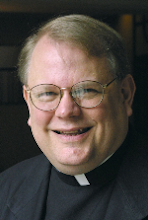
A very interesting thing is how many times in his stories Jesus makes comparisons.
He contrasts a man and a woman, a disciple and a soldier, a Jew and a Gentile, an individual and a crowd. We see how different they are and learn something vitally important about ourselves - something meant to save us.
And so, a leading holy man hosts a dinner for Jesus - but fails to welcome him with the usual hospitality. Also present is a sinful woman who washes the guest's feet and dries them with her hair. That night we learned who was really holy!
Or we see 3 men walking - the first two: a priest and a Levite - both respected - then a third, from Samaria, wherever that is. Who helps the fourth, the one lying half dead on the side of the road? You remember. The third, the foreigner.
There are wise and foolish virgins - five with oil in hand, waiting in vigil. Five distracted and shut out.
We hear of men with places of honor at banquets, now brought low - and of those sitting way back suddenly called up.
I think of a father with two sons - one dutiful, the other wasteful. The younger one wises up and becomes the father's joy. The older can't bear it and maybe never gets over it.
Comparisons - so often with a twist or a hook you don't see coming - all meant to teach holiness - the work of a Master Teacher.
Today, we hear another. On center stage at the Temple: a Pharisee and a tax collector. Both come to pray.
Now, we're probably so conditioned to think of the Pharisees as bad people that we think this one bad. He may not have been that bad! Let's not forget his goodness. That's a point Jesus makes.
On the other hand, we may be conditioned to think every tax collector convertible - like Matthew the tax collector. Don't be fooled. Tax collectors were terrible. Jesus knows that.
The Pharisee begins by thanking God. That's not a bad way to start your prayer, by thanking God. He thanks God for not being greedy, dishonest, or adulterous.
We have to take him at his word. He's telling the truth. Almost certainly he was generous, honest and monogamous.
He's probably done a lot of good. If we'd known him, we might even like him.
His problem was attitude. The wrong attitude.
Yes, he was generous, honest and monogamous. The Law dictates this.
But the whole the point of The Law is to draw him - and everyone else - closer to God - closer to others It provides the structure we need to get closer to God.
The good actions of the Pharisee, formed in The Law - should have tied him to others and especially to God.
You know, the word 'religion' comes from Latin, religere. It means "to tie back to." We have religion to tie us back to God and one another.
The Pharisee rejoices that it separates him from the other man. He's thinks he's better.
This is the key, the crux of the matter, the point Jesus is making. The Pharisee's slavish pursuit of law separates him from others.
He revels in the comparison between himself and the other. He's not tying himself to the other. And, his prayer is an act of self-love - not God-love.
That's a real problem.
The tax collector, on the other hand, is not a good man. Objectively, we'd say he was bad. He hurts people.
He's worked for the oppressive Romans against his own people. He's bilked everyone - probably even his own flesh and blood. They hate him.
It was only appropriate that he stand at a distance in the Temple, beat his breast and not look up to heaven. He's despicable - the worst gangster imaginable.
But his prayer is so good - so sincere - we use it as an act of contrition in that confessional box. "O God, be merciful to me a sinner."
He's not there to compare himself to anyone. He goes face to face with God; desperately seeks to tie himself to God, see God, and be moved by God - all in the spirit of true religion.
Jesus shines the spotlight on him.
What's the Lord teaching us?
The Law is good, very good. After all, he said he didn't come to abolish the rules.
Our religious practice is meant to form us - help us turn to God - never to make us feel superior. Its supposed to draw us together - draw us to God.
We who have fallen away from God and we alienated from one another need to be tied back.
Draw in The Law and draw in divine life.
Go face to face with God and say, humbly, "be merciful to me a sinner."
Monsignor Thomas J. Sullivan
Chancellor

